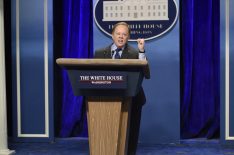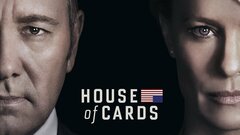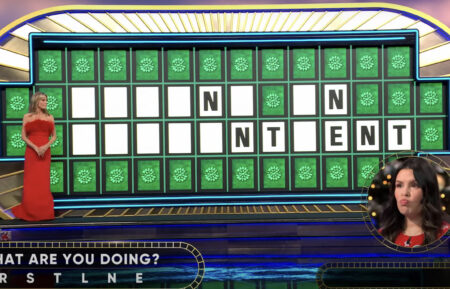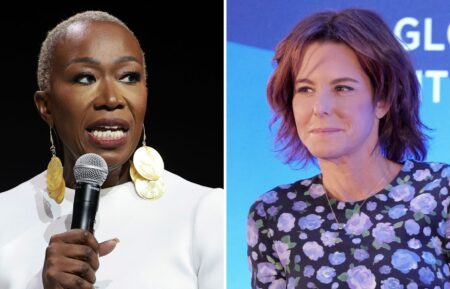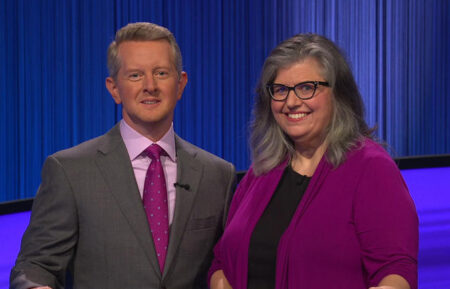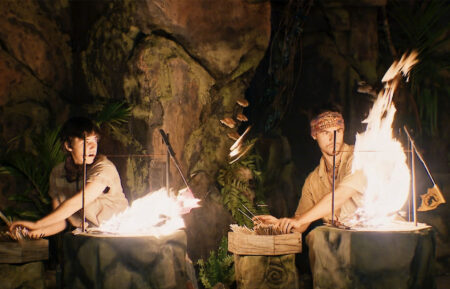‘House of Cards’ Showrunners on Their First Season of the Trump Era
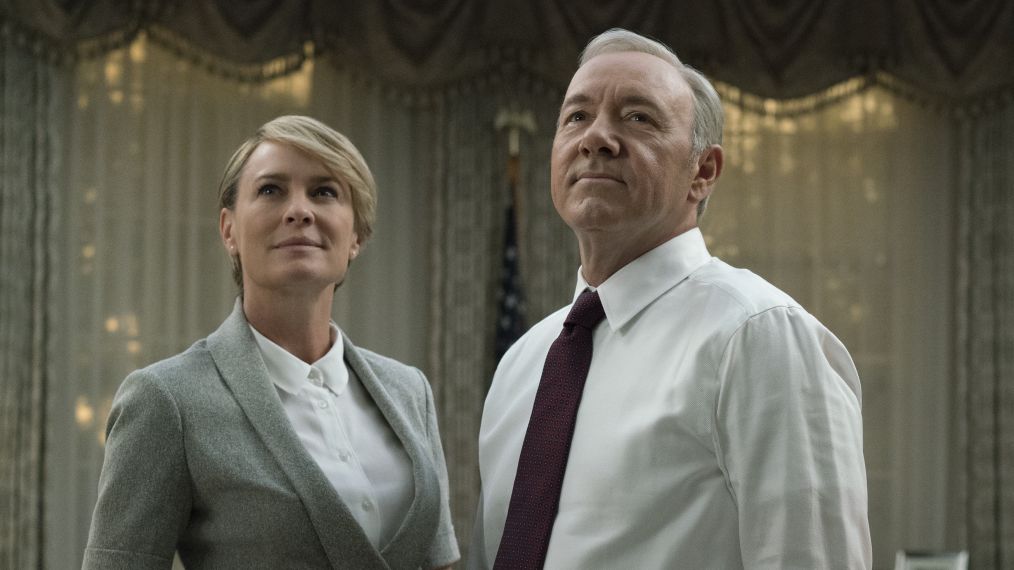
On November 8, 2016, House of Cards showrunners Frank Pugliese and Melissa James Gibson were on set block-shooting episodes 10 and 11 of the show’s fifth season. Many of the women on set that day came to work in pantsuits, a salute to Hilary Clinton, whose historic victory they expected to celebrate later that night. Which is not to say, Pugliese hastens to add, that there weren’t Trump supporters on set as well. But like most everywhere else in the country, and possibly in the world, the overwhelming sense was that after a bitterly divisive campaign that many felt had brought out the worst in America, the country was poised to elect its first female president.
Looking back, Gibson describes the memory of all those women on the set of the show’s White House, where the ruthless Frank and Claire Underwood (Kevin Spacey, Robin Wright) have been ensconced since Season 3, as surreal.
“We probably stopped shooting around 7pm, so there was not enough information at that point,” she remembers.
Pugliese went to bed early that evening, after a long day on set that had begun at 6am. But he happened to wake up around 11pm ET, about the time that Iowa was called for Trump, narrowing Clinton’s path to victory significantly. “I was like, Ok, there’s something going on here.”
The days that followed were somber on set. According to Gibson, an overwhelming sense of disbelief hung over the cast and crew—particularly when it came to filming the inauguration scenes, which come at the end of the season-long general election campaign. “I remember Michael Kelly feeling like it was pretty bizarre to be shooting that celebration on that particular day.”
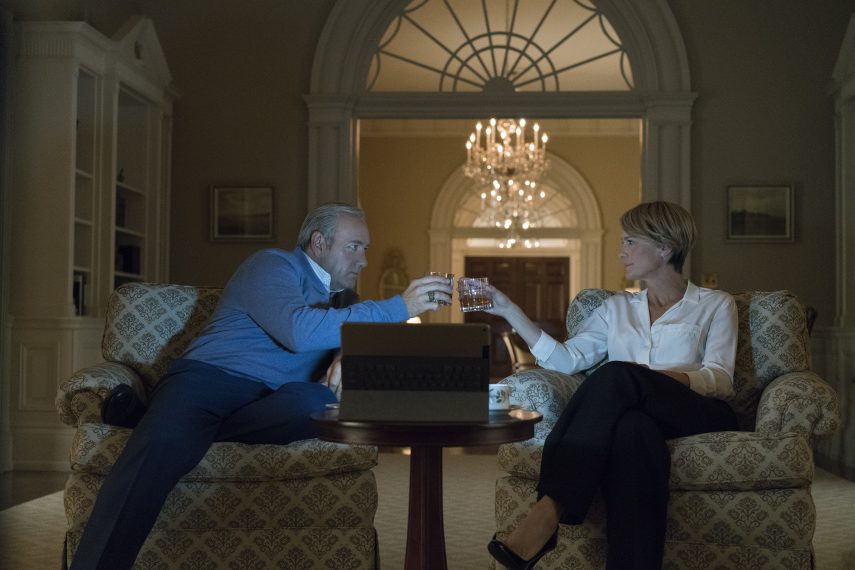
Season 5 is Pugliese and Gibson’s first as co-showrunners. When they took over for series creator Beau Willimon after Season 4, they couldn’t have known that they would be helming the first season of House of Cards of the Trump era.
No matter what, this season—and in retrospect, the entire series—will now be viewed in the context of the Trump presidency. It’s a phenomenon that isn’t specific to House of Cards, or even to political dramas. In 2017, there’s not much on TV, or in culture in general, that won’t be read in some way as a reaction to or reflection of the unprecedented political climate. The same probably would have been true had Clinton won. Still, House of Cards seems particularly apropos of the current moment: the conspiracies, the corruption, the uniquely reprehensible man in the Oval Office.
“We do a lot of research, and we work with experts and try to keep in touch with what’s happening on a daily basis, politically,” Pugliese explains. Work on Season 5, which takes place during the general election that pits the Underwoods against Republican nominee Will Conway (Joel Kinnamen), actually began during the 2015 primaries. “But I can’t say it was directly affecting what we were working on,” says Pugliese.
House of Cards has never been a “ripped from the headlines” kind of show, though there have always been elements that echoed what was going on in culture and politics: the Underwoods’s dealings with the Russian president (Lars Mikkelsen), Franks rhetoric about populism and nationalism, last season’s climactic arch about a hostage situation involving a homegrown terrorist cell known as ICO.
Contemporary politics is, Gibson says, “the backdrop of what we do.” The daughter of a Canadian politician and a journalist, she grew up keenly aware of politics.
Pugliese spent time at London’s Royal Court, where political drama was a part of every season. “There’s a space between the public character that a politician is and who they are privately,” he explains. “There’s always gonna be drama there.”
No matter what is going on in real life politics, House of Cards is, ultimately, telling a story that was begun five years ago—the story of a very particular relationship, and very particular characters who will do anything to consolidate power. Some critics have characterized the show as a political soap opera dressed up in the trappings of a prestige drama. The show is often Shakespearean in its audacity, the Underwoods’s machinations regularly stretching the limits of credulity. Until recently at least.
“The show’s digging into the boundaries of democracy,” say Gibson, “and I feel like so is the real world right now.”
Increasingly, however, the series seems to be evolving into something entirely new: a political horror story. Spacey’s conspiratorial asides to the audience have begun to feel more threatening, as if, where his mask to slip just a little bit more, we would see something less than human beneath. Season 4 ended with both the Underwoods looking directly at the audience as Frank telling us in no uncertain terms that we should be very afraid of them. “We are the terror.”
“We made a very specific choice to work with terror,” says Pugliese, “but to see how it plays out in the imagination of the voter.”
Fear is at the heart of the Underwoods’s campaign this season—a concept that will feel familiar to American voters who saw Donald Trump play on anxieties about domestic terrorism to gin up support among his base. As the election heats up, the president and first lady will find themselves backed into a corner, the fallout from last season’s hostage situation and their previous misdeeds closing in on them. “You want to see what these characters will do,” Pugliese says. “And they’ll do anything. That’s what’s been established when it comes to Francis and Claire.”
The Underwoods may have declared war on terrorism both home and abroad, but says Gibson, “the real battleground is the psyche of the American citizen. That seemed like the place where the most dangerous war could play out.”
It should go without saying that the news coming out of the White House on a daily basis is anything but boring. The steady stream of leaks and scandals has been great for late night, with shows like The Late Show, Full Frontal with Samantha Bee and SNL seeing a boost in ratings. But will the appetite for political commentary translate to House of Cards?
“I don’t know if we can know. I get why it would be good for comedy. I think I would need someone to give me some perspective and put a smile on my face before I go to sleep. TV is in your living room, it’s in your bedroom, so I get that relationship.”
There is apparently a running joke among Beltway insiders: House of Cards is what Washington wishes it was like, but Veep, HBO’s comedy about the venal, incompetent squabbling and chaos at the heart of government, is what Washington is actually like. Gibson and Pugliese have heard that one before, but it still strikes them as perversely funny.
“I wish Washington was not like a TV show! I wish Washington was not invested creating conflict and drama, but was rather invested in concensus and unity,” Pugliese says. “I would like Washington to get really boring.”
House of Cards Season 5, May 30, Netflix

